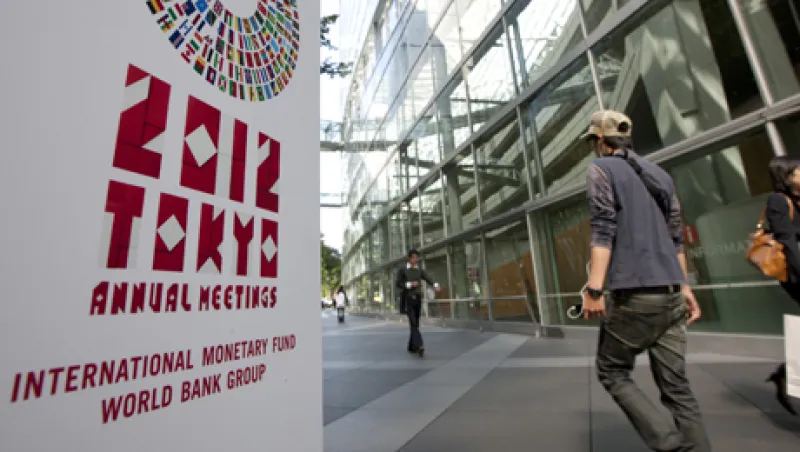Among Institutional Investor ’s gleanings from the IMF-World Bank annual summit in Tokyo today and yesterday: Emerging nations are pursuing anti-inflation policies and embracing fiscal rectitude even at the risk of growth, but still need IMF help doing so. Yet the IMF itself needs help in some cases.
The Bahamas aims to reduce its government debt from 49 percent of GDP to 40 percent in the coming five years, finance chief Michael Halkitis told II on the sidelines of the meeting. This itself is newsworthy, as Standard & Poor’s revised its outlook on the nation to negative from stable last month. And some of the particulars Halkitis disclosed are particularly noteworthy. Rather than cutting spending to reduce the fiscal deficit, the finance ministry will focus on raising revenues, particularly property taxes, according to the ministry’s financial secretary, Ehurd Cunningham. That’s no mean feat for a country that consists of 3,000 islands spread across 5,300 square miles in the Caribbean. So the government is boosting the number of assessors on the job. The potential upside is worth the efforts, says Cunningham, who estimates that up to 30 percent of homes in the nation of 356,000 residents are not in the government’s registry. Just by registering and assessing all private property, he says, the Bahamas can boost property tax revenues from the current 1 percent of GDP to 2 percent. Another property-tax raising gambit is to convince offshore real estate investors to buy second homes there.
Timore-Leste, a nation of 1 million that broke away from Indonesia in 2002, today has a sovereign wealth fund of $10 billion and per capita GDP that topped $8,000 in 2011, up tenfold since its establishment. But the minister of finance Emilia Pires told the meeting yesterday that she needs technical help from the IMF to keep her nation’s finances on a sound footing. In particular, she cited the need to convince the populace to be patient about economic growth, noting “my people demand we take more money [out of the sovereign wealth fund] and put it into the economy.” Although Pires said the government now has an appropriate concern over the inflationary potential of acceding to such a demand, she acknowledged that “we didn’t understand this” as recently as five years ago.
The IMF spends up to a quarter of its annual budget of $1 billion to help such nations improve their policies. But the results are often mixed, simply because its representatives are unfamiliar with the countries in which they operate, Yuba Raj Khatiwada, the governor of Nepal’s central bank, complained yesterday. “We would suggest advisers be selected based on experience of working in the region,” Khatiwada said. “That would help in terms of delivering better service.” In Nepal’s case, he added, the bank discovered that it needed to help IMF advisers understand the national culture before they could be of much use. “The IMF needs feedback on its advisers,” Khatiwada says. “If feedback isn’t so good, perhaps it’s necessary to get rid of them. Advisers need to be trained in country sensitivities.”





